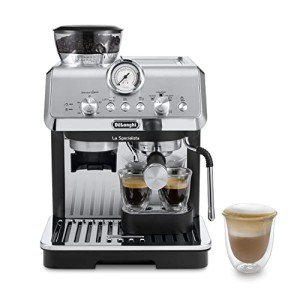The World of High-Quality Espresso Machines: A Comprehensive Guide
Espresso has actually become a beloved drink among coffee enthusiasts worldwide, understood for its abundant flavor, extreme scent, and adaptability. The heart of a fantastic espresso lies in the machine used to brew it. High-quality espresso machines are created to provide the best shot, making them an important financial investment for coffee lovers. This post checks out various types of high-quality espresso machines, their functions, upkeep ideas, and answers to frequently asked questions.
Types of High-Quality Espresso Machines
High-quality espresso machines fall under several classifications, dealing with various preferences, ability levels, and spending plans. The main types include:
| Type of Machine | Description | Ideal User |
|---|---|---|
| Manual Espresso Machines | Needs user ability to control extraction and pressure. Offers the most control over the developing process. | Experienced baristas and enthusiasts |
| Semi-Automatic Machines | Combines manual operation with automation. Users control the grind and tamping, while the machine manages water dispersion. | Intermediate users |
| Automatic Espresso Machines | Automate the brewing process, permitting for programmable developing times and temperatures. | Casual coffee drinkers |
| Super-Automatic Machines | Have built-in grinders and are fully automated, dealing with everything from grinding to brewing and steaming. | Users looking for benefit |
| Commercial Espresso Machines | Created for high volume use in coffee shops and dining establishments, providing sturdiness and speed. | Company owner |
In-depth Overview of Each Type
Manual Espresso Machines
- Pros: Complete control over the brewing procedure; can produce extraordinary quality espresso.
- Cons: Requires substantial ability; time-consuming.
Semi-Automatic Machines
- Pros: Balanced control, mixing manual and automatic procedures; remarkable quality espresso is still attainable.
- Cons: Requires some understanding and experience to master.
Automatic Espresso Machines
- Pros: User-friendly; lowers the learning curve while still producing high-quality espresso.
- Cons: Still needs some understanding of coffee-making basics.
Super-Automatic Machines
- Pros: Maximal convenience; little skill needed; ideal for individuals or households who desire coffee without hassle.
- Cons: Higher price point; might lack the fine-tuning abilities of manual machines.
Commercial Espresso Machines
- Pros: Built for longevity and performance; often consists of features for high-volume turns.
- Cons: Expensive; might be overkill for home use.
Secret Features to Consider
When trying to find a high-quality espresso machine, several crucial functions need to be taken into account:
- Pressure and Pump Type: Look for machines with at least 9 bars of pressure, which is important for extracting the very best flavor from coffee beans.
- Boiler Type: Single, double, and heat exchanger boilers each affect how the machine carries out and the speed of brewing.
- Build Quality: High-quality products such as stainless-steel are more suitable for sturdiness and looks.
- Ease of Use and Cleaning: Some machines need substantial cleaning, while others are created for easy upkeep.
- Temperature level Control: Consistent temperature level is crucial; think about machines with PID controllers for accurate control.
Benefits of High-Quality Espresso Machines
Purchasing a high-quality espresso machine uses a wide variety of advantages:
- Superior Quality: High-end machines enable greater control, leading to more delicious espresso.
- Toughness: Built to last, quality machines require fewer repair work and replacements.
- Personalization: Users can take pleasure in a customized experience by changing grind size, shot timing, and other settings.
- Increased Convenience: Automatic and super-automatic options allow aficionados to take pleasure in espresso with minimal effort.
Upkeep and Care for High-Quality Espresso Machines
To keep an espresso machine functioning efficiently, regular maintenance is crucial. Here are suggestions for maintaining a high-quality espresso machine:
Descale Regularly:
- Use a descaling service every couple of months to avoid buildup of minerals from water, which can impact flavor and performance.
Tidy the Brew Group:
- For machines with a removable brew group, tidy it routinely to guarantee a tidy extraction.
Replace Water Filters:
- Use a water filter and change it as needed to reduce impurities in your developing water.
Daily Cleanings:
- Rinse the portafilter and group head after each use to avoid oil accumulation.
Keep an Eye on the Parts:
- Monitor seals, gaskets, and other parts for wear and tear and change them as required.
Often Asked Questions (FAQs)
1. What is the very best espresso machine for beginners?
For beginners, a semi-automatic machine often offers a good balance of functionality and control, enabling users to learn the skills necessary for making terrific espresso.
2. Are super-automatic machines worth the financial investment?
Yes, for those who focus on benefit and ease over control, super-automatic machines can be a worthy financial investment, especially for households or busy specialists.
3. Just how much should I expect to invest on a high-quality espresso machine?
High-quality espresso machines range considerably in price, with manual machines starting at a few hundred dollars, while super-automatic or commercial machines can surpass a number of thousand.
4. Can Espresso Machines Under £200 make other coffee drinks with an espresso machine?
Yes, many espresso machines have steam wands or accessories that permit users to develop lattes, cappuccinos, and more.
5. The length of time do espresso machines generally last?
With proper maintenance, high-quality espresso machines can last over a decade, making them a long-lasting financial investment in your coffee satisfaction.
High-quality espresso machines yield a transformative coffee experience, whether delighted in in your home or in a commercial setting. By comprehending Buy Coffee Maker , their functions, and the maintenance required to keep them running effectively, customers can make informed decisions that raise their coffee-drinking experience.

